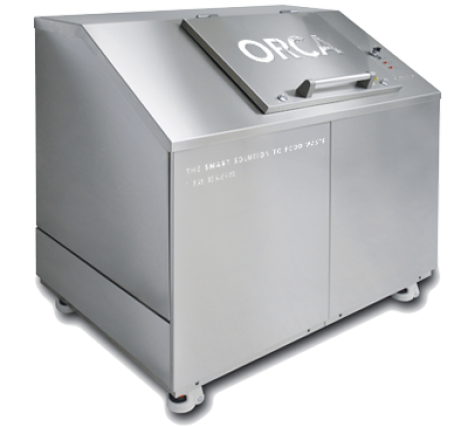A new collection
bin has appeared on the curbsides of New York City. Small, brown dumpsters with declarations of
‘organic waste’ on their countenance encourage city dwellers to deposit their
banana peels and apple cores rather than sending them to the landfill. New York City sends about 1.3 million tons
of food waste to landfills each year
- the single largest item in the
mix. With landfill space on the east
coast quickly getting used up, something had to give.
New Yorkers can
give themselves a pat on the back for participating in the drive to reduce
landfill waste, but the big food waste problem is not in the home. It is in the restaurant. According to the Food Waste Reduction Alliance a half
pound of food waste is created for every meal served in a restaurant, from the
peelings in the kitchen to leftovers on the plate. More than three quarters of this waste is
sent to landfills and only a small portion is recycled or donated to the needy.

Canada-based Orca
offers restaurants a food waste solution that eliminates the burden on
landfills. Named for its functions -
Organic Refuse Conversion Alternative
- the ORCA system is an on-site natural digester for commercial volume
food waste. Microorganisms digest the
food waste into a liquid that can be disposed into municipal or commercial
sewer pipes. The system is fully
enclosed by a stainless steel case that helps the system ‘blend in’ with other
food service equipment. Customers can choose to purchase or lease.
Orca offers four
different sizes of its digester system that make it usable in a variety of
situations from campus food services, to restaurants to cruise ships. Introduced in September 2018, the most recent
addition to the product line is the Baby
ORCA. As the smallest system it is
capable of recycling up to 360 pounds of food waste each day. It needs only five square feet of space in a
restaurant’s back room.
 The ORCA system saves on landfill space,
reduces landfill greenhouse gases, and can eliminate disposal fees.
Nonetheless, it does not itself capture any value from the food waste. The organic material is still sent away from
the customer’s establishment as waste - just in a liquid rather than solid form. However, a municipality with some sort of
biogas or fertilizer program could increase production volumes from the new
inflows of organic-laced liquids.
The ORCA system saves on landfill space,
reduces landfill greenhouse gases, and can eliminate disposal fees.
Nonetheless, it does not itself capture any value from the food waste. The organic material is still sent away from
the customer’s establishment as waste - just in a liquid rather than solid form. However, a municipality with some sort of
biogas or fertilizer program could increase production volumes from the new
inflows of organic-laced liquids.
There are other similar systems competing with ORCA. A start up called Power Knot has also developed
an enclosed food waste digester for commercial scale kitchens. Power Knot’s LFC system is used by a diverse group of
kitchen operators around the world from the fancy seafood restaurant Nobu to the
more utilitarian U.S. Army. Power Knot
is headquartered in the United Kingdom and has sales offices on three other
continents.
Orca has installations in North America as well as the U.K., Europe, Asia and South America. The company has collected experiences from a wide array of customers, including restaurants, cruise ships, food services and college commissaries.
Orca has installations in North America as well as the U.K., Europe, Asia and South America. The company has collected experiences from a wide array of customers, including restaurants, cruise ships, food services and college commissaries.
The Orca team
may have a lot of data on how their customers are doing with the ORCA system, but investors will find few
data points on the company. As a private
company Orca has no reporting responsibilities.
Nonetheless, investors who want to support environmental
solutions may be well rewarded by watching for news from Orca. Future plans to expand could serve up
opportunities to participate in a private placement of equity capital or that even an initial public offering.
Neither the author of the Small Cap Strategist web
log, Crystal Equity Research nor its affiliates have a beneficial interest in
the companies mentioned herein.
No comments:
Post a Comment